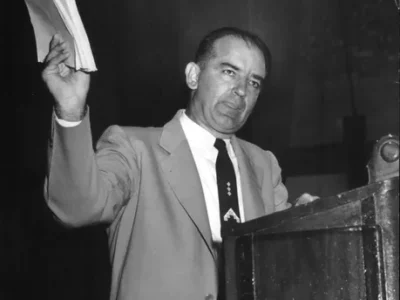Previewing This Week’s Constitutional Battle Over California’s Low Carbon Fuel Standard
 On Tuesday morning, October 16th, attorneys will gather at the U.S. Court of Appeals for the Ninth Circuit’s majestic courthouse in downtown San Francisco to argue one of the nation’s most important, currently-pending environmental cases. The case is Rocky Mountain Farmers Union v. Goldstene, and the issue is the constitutionality of California’s Low Carbon Fuel Standard (LCFS). The LCFS, in turn, is one key component of California’s multifaceted strategy to reduce the state’s aggregate emissions of greenhouse gases.
On Tuesday morning, October 16th, attorneys will gather at the U.S. Court of Appeals for the Ninth Circuit’s majestic courthouse in downtown San Francisco to argue one of the nation’s most important, currently-pending environmental cases. The case is Rocky Mountain Farmers Union v. Goldstene, and the issue is the constitutionality of California’s Low Carbon Fuel Standard (LCFS). The LCFS, in turn, is one key component of California’s multifaceted strategy to reduce the state’s aggregate emissions of greenhouse gases.
Midwestern biofuels manufacturers and national crude oil producers challenged the California Air Resources Board’s LCFS in federal district court in Fresno. They argued that the LCFS is unconstitutional on two separate grounds: first, that it violates the dormant Commerce Clause of the U.S. Constitution by discriminating against interstate commerce and attempting to regulate in an “extraterritorial” manner–i.e., beyond California’s borders. Second, they contended that the LCFS is preempted by the federal Clean Air Act.
Last December, U.S. District Judge Lawrence O’Neill ruled in favor of the industry plaintiffs on their claim that the LCFS as applied to them violates the dormant Commerce Clause. He simultaneously enjoined the ARB from implementing the LCFS while the litigation was pending.
The ARB, along with several environmental groups who had previously intervened in the litigation to support California’s LCFS, promptly appealed the adverse district court ruling to the Ninth Circuit. In April, the Court of Appeals provided California with a partial, short-term victory, staying the district court injunction and allowing ARB to implement the LCFS while the appeal was ongoing. The parties filed their written legal arguments over the summer.
The Ninth Circuit has scheduled oral arguments for this Tuesday morning. The case will be heard by a three-judge panel consisting of Ninth Circuit Judges Betty Fletcher, Dorothy Nelson and Mary Murguia–a group of rather progressive jurists who might be expected to be relatively sympathetic to the state’s and environmental groups’ legal arguments. The California Attorney General’s Office and an attorney for the Environmental Defense Fund will advocate for appellants before a packed courtroom on Tuesday, while one or more private firm attorneys will be arguing for the industry appellees.
This high-profile case has drawn the attention and participation of a small army of “friends of the court” who have filed amici briefs on both sides. Notably, a group of “blue” states has submitted written arguments in support of California and its LCFS, while a coalition of “red,” mostly Midwestern states have filed briefs allying themselves with the industry challengers to the LCFS.
The one thing on which all of the litigants can agree is the broader significance of this litigation. How the Ninth Circuit rules on the dormant Commerce Clause challenge will plainly have an enormous impact on the long-term viability of the LCFS. But the court’s constitutional analysis is also likely to have a major precedential effect on other components of California’s broad efforts to regulate major reductions to the state’s aggregate greenhouse gas emission levels. For example, the Air Resources Board’s controversial cap-and-trade program, which is just now being implemented, is likely to face a comparable dormant Commerce Clause challenge from industry. And in recent years the dormant Commerce Clause has become an increasingly popular constitutional theory upon which a wide variety of state and local environmental regulations are being attacked in litigation around the country. That’s why industry, environmental organizations and government regulators nationwide are all watching the Rocky Mountain Farmers Union case so intently.
However the Ninth Circuit rules following Tuesday’s oral arguments, it’s likely that the case will not end there. The losing party will undoubtedly seek review from a broader, en banc assemblage of Ninth Circuit judges and, ultimately, from the U.S. Supreme Court. The perhaps rash prediction from this long-time Supreme Court observer is that there’s at least a 50-50 chance that the Supreme Court will wind up granting the seemingly inevitable petition for certiorari in Rocky Mountain Farmers Union.
(Full disclosure notice: this commentator, along with Legal Planet colleague Dan Farber, joined in a law professors’ amicus brief filed in the Ninth Circuit on behalf of California in the LCFS appeal.)
Reader Comments
4 Replies to “Previewing This Week’s Constitutional Battle Over California’s Low Carbon Fuel Standard”
Comments are closed.







I also joined the brief filed by law professors. Sean and Cara participated in a different amicus. Legal Planet definitely weighed in on the side of the ARB.
I also joined the brief filed by law professors. Sean and Cara participated in a different amicus. Legal Planet definitely weighed in on the side of the ARB.
This will certainly be an important case. The district court’s particularly aggressive use of the dormant Commerce Clause doctrine bodes ill for many other state laws regulating greenhouse gases, including California’s cap-and-trade program. The district court’s analysis seems likely to be reversed or at least cabined, though, given the panel. Readers curious about the (unfortunately many) aspects of California’s cap-and-trade program that make it vulnerable to a dormant Commerce Clause challenge may be interested in taking a look at my new paper, which is available here: http://papers.ssrn.com/sol3/papers.cfm?abstract_id=2135956.
This will certainly be an important case. The district court’s particularly aggressive use of the dormant Commerce Clause doctrine bodes ill for many other state laws regulating greenhouse gases, including California’s cap-and-trade program. The district court’s analysis seems likely to be reversed or at least cabined, though, given the panel. Readers curious about the (unfortunately many) aspects of California’s cap-and-trade program that make it vulnerable to a dormant Commerce Clause challenge may be interested in taking a look at my new paper, which is available here: http://papers.ssrn.com/sol3/papers.cfm?abstract_id=2135956.